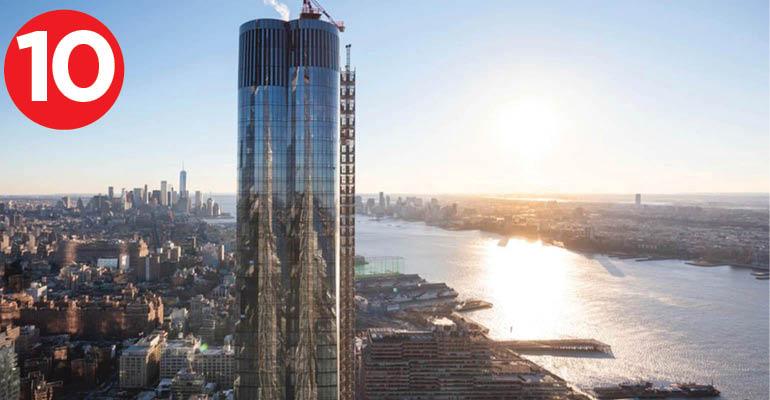- How to Avoid the Next Real Estate Downturn “Real estate investments, whether residential or commercial, have long been associated with wealth creation in the United States. The 2007 housing crash put a damper on that; the market lost about a quarter of its value over two years. Housing has since stabilized, although sales have been sluggish in the face of rising interest rates. In a recession, though, the value of real estate — a mix of the home’s or building’s value and its location — becomes harder to discern. An investment can become illiquid when the market drops as the number of buyers dries up, and sellers have to learn to be patient to avoid taking a loss.” (The New York Times)
- Few Americans See Savings from Trump’s Tax Reform: Reuters/Ipsos Poll “Only one in five U.S. taxpayers expect to pay less income tax this year as a result of the tax reform law passed in 2017 by Republicans who promised big savings for everyday Americans, according to a Reuters/Ipsos opinion poll released on Friday. The poll suggested that the tax overhaul, mostly geared to helping businesses, may not be as strong a 2020 campaign talking point as Republicans and President Donald Trump had hoped.” (Reuters)
- Trump’s EPA Opens the Door for Massive San Francisco Bay Development “A sprawling stretch of salt ponds on the western edge of San Francisco Bay, once eyed for the creation of a virtual mini-city, is back at the center of debate over regional development after the Trump administration this month exempted the site from the Clean Water Act. With the regulatory hurdle out of the way, real estate company DMB Pacific Ventures says it’s reopening discussion about what to do with the unusually large chunk of undeveloped land at the heart of Silicon Valley in Redwood City.” (San Francisco Chronicle)
- A First Step: Senators Introduce Bill to Fix Costly Depreciation Mistake in GOP Tax Law “You brought your financial information to your tax preparer, and she showed some concern at the large profit the businesses were showing. ‘Worry not,’ you assured her, ‘I put $1 million into improving the restaurants that we can immediately deduct. That'll bring us back to where we need to be.’ And it was at that moment that your tax preparer made a face that was deeply, deeply concerning. She went on to explain, ‘yeah, about that...you're going to have to depreciate that $1 million over 39 years.’” (Forbes)
- Build-a-Bear Wants to Crash Shoppers’ Family Vacations “Build-A-Bear Workshop Inc. is shifting its strategy on store locations, setting its sights on locations that will attract families on vacation rather than stores in traditional malls. Mall traffic has declined by about half over the last five to six years, according to Sharon Price John, Build-A-Bear’s chief executive, though she acknowledges that not all malls are created equal. And when adults go to the mall, it has become more likely that they won’t take children with them.” (MarketWatch)
- Hudson Yards May Be the Moment of Truth for How Online Brands Compete in the Real World “Brands born on the internet will have a home at Manhattan's new mega mall. At Hudson Yards, an 18-million-square-foot real estate development on the New York's West Side, 1 million square feet will be devoted to retailers like Lululemon, Sephora, Louis Vuitton and Fendi. It will also include a space dedicated to brands that started online and are now starting to open storefronts, like shoemaker M.Gemi and sock retailer Stance.” (CNBC)
- Amazon HQ2 Runs into Community Activists in Virginia, Too “Virginia’s legislature already has agreed the state will pay Amazon $550 million if the online giant creates 25,000 jobs with an average salary of at least $150,000 over 12 years. The state payments will rise to $750 million if the commonly called HQ2 grows to 37,850 workers in the Crystal City and Pentagon City business districts near Washington, D.C. The Arlington County Board is expected to hear from more than a hundred residents about a smaller piece of the package: a projected $23 million payment to Amazon over 15 years from anticipated increases in a local hotel tax.” (Wall Street Journal, subscription required)
- Ulta Beauty on Fire in Q4; Opening 80 Stores in 2019 “Ulta Beauty on Thursday reported results for its fourth quarter that beat the Street amid a surge in store traffic and online sales. The beauty giant also confirmed previously announced plans to open about 80 new stores in fiscal 2019. In addition it will undertake some 20 remodel or relocation projects and complete approximately 270 store refreshes. Ulta’s net sales increased 9.7% to $2.12 billion in the quarter ended Feb.2, compared to $1. 93 billion in the year-ago period, which had an extra week.” (Chain Store Age)
- Real Estate for the Afterlife “If the ever-soaring price of condos in New York City has your head spinning, wait until you shop for a cemetery plot. Prices for the last piece of real estate that any New Yorker will ever own — a cemetery plot or an aboveground crypt — have also climbed significantly over the years. Basic cemetery plots across the five boroughs now generally cost $4,500 to $19,000, not including hefty fees for foundations, interments and maintenance.” (The New York Times)
- Macy’s Plans Additional Backstage Stores “Remember back in the day when shopping at an off-price department store meant there was a good chance that you would end up weighing the pros and cons of buying a shirt with mismatched sleeve lengths, a missing button or a collar that looked like it had been sewn on by a middle-school student having a bad day in home economics class? That’s not the case these days, as off-price chains such as TJ Maxx, Burlington and Marshalls are growing, spurred by customer demand for their high-quality, sometimes name-brand goods, which require no ‘adjustments’ at home.” (Newsday)
0 comments
Hide comments

